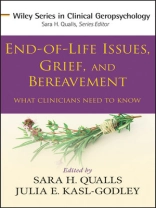A practical overview of clinical issues related to end-of-life care, including grief and bereavement
The needs of individuals with life-limiting or terminal illness and those caring for them are well documented. However, meeting these needs can be challenging, particularly in the absence of a well-established evidence base about how best to help. In this informative guide, editors Sara Qualls and Julia Kasl-Godley have brought together a notable team of international contributors to produce a clear structure offering mental health professionals a framework for developing the competencies needed to work with end-of-life care issues, challenges, concerns, and opportunities.
Part of the Wiley Series in Clinical Geropsychology, this thorough and up-to-date guide answers complex questions often asked by patients, their families and caregivers, and helping professionals as well, including:
* How does dying occur, and how does it vary across illnesses?
* What are the spiritual issues that are visible in end-of-life care?
* How are families engaged in end-of-life care, and what services and support can mental health clinicians provide them?
* How should providers address mental disorders that appear at the end of life?
* What are the tools and strategies involved in advanced care planning, and how do they play out during end-of-life care?
Sensitively addressing the issues that arise in the clinical care of the actively dying, this timely book is filled with clinical illustrations, guidance, tips for practice, and encouragement. Written to equip mental health professionals with the information they need to guide families and others caring for the needs of individuals with life-threatening and terminal illnesses, End-of-Life Issues, Grief, and Bereavement presents a rich resource for caregivers for the psychological, sociocultural, interpersonal, and spiritual aspects of care at the end of life.
Tabela de Conteúdo
Contributors v
Preface vii
1 Introduction to End-of-Life Care for Mental Health Professionals 1
Julia E. Kasl-Godley
2 Trajectories of Chronic Illnesses 26
Michelle S. Gabriel
3 The Cultural Context of Spirituality and Meaning 43
E. Alessandra Strada
4 Working With Family Caregivers of Persons With Terminal Illness 64
David B. Feldman and Jasmin Llamas
5 Serious Mental Illness 85
Julia E. Kasl-Godley
6 Advance Care Planning 116
Michelle S. Gabriel and Sheila Kennedy
7 Pharmacologic Management of Pain 128
W. Nat Timmins
8 Nonpharmacological Approaches to Pain and Symptom Management 148
Stephanie C. Wallio and Robert K. Twillman
9 Grief and Bereavement Care 168
Shirley Otis-Green
10 Complicated Grief 181
E. Alessandra Strada
11 Health-Care Teams 201
Julia E. Kasl-Godley and Donna Kwilosz
12 End-of-Life Care in Long-Term Care Settings 229
Mary M. Lewis
13 Advocating for Policy Change: The Role of Mental Health Providers 252
Robert K. Twillman and Mary M. Lewis
14 Physician-Assisted Suicide in the United States: Issues, Challenges, Roles, and Implications for Clinicians 263
Silvia Sara Canetto
15 Creating Ethics Conversations in Community 285
Malham M. Wakin
16 Professional Self-Care 294
E. Alessandra Strada
17 Embracing the Existential Invitation to Examine Care at the End of Life 310
Shirley Otis-Green
Author Index 325
Subject Index 335
Sobre o autor
SARA H. QUALLS, PHD, is Professor of
Psychology, Director of Clinical Training in Geropsychology, and
Director of the Gerontology Center at the University of Colorado at
Colorado Springs. She has twenty years of academic, clinical, and
continuing education training experience and is the co-chair of the
Adult Development and Aging Division of the American Psychological
Association (APA).
JULIA E. KASL-GODLEY, PHD, is Coordinator
of Psychology Training at the Palo Alto Veterans Affairs
Interprofessional Palliative Care Fellowship Program in California.
She has published on interventions for anticipatory grief and
end-of-life care and is the recipient of the APA’s 2003 Theodore
Blau Early Career Award for Outstanding Contribution to
Professional Clinical Psychology.












